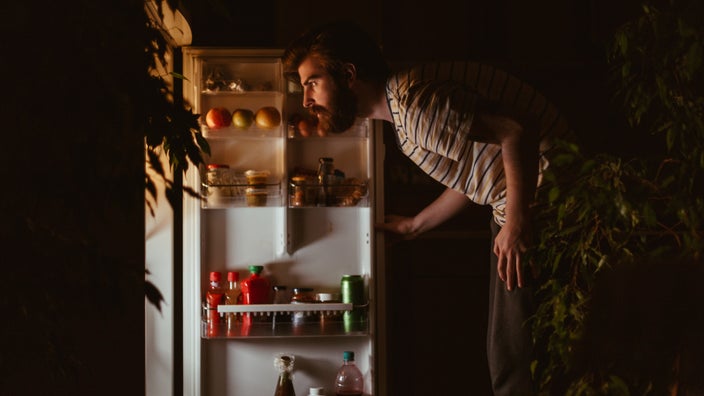
12 Healthy Late-Night Snacks That Won’t Ruin Your Sleep (and May Even Help It)
Key takeaways:
Some research suggests that late-night snacking may be linked to weight gain. But a small, nutrient-dense snack may actually improve your sleep.
The best late-night snacks are moderate in size and nutrient-dense. Some foods may even help you sleep. For a good late-night snack, try nuts, pumpkin seeds, or unsweetened Greek yogurt.
Try to avoid late-night snacks high in sugar, fat, or spice.
Table of contents

Snacking sometimes has a bad reputation — especially when it comes to late-night snacks. You may have been told that snacking at night is bad or unhealthy. But snacking at night isn’t always bad for you.
If you’re hungry for a late-night snack, go ahead and have one. Listening to your body is usually a good thing. Just try to reach for foods that are nutritious and help you get a better snooze.
Here are 12 nutritious late-night snack ideas.
Save over 40% on Qsymia with GoodRx
Discover the once daily Qsymia for weight management. Qsymia is for adults and children 12-17 in combination with a healthy diet and regular exercise.

1. Cherries
If you like cherries, you’re in luck. They’re a great food to stock up on for late-night snacks. Not only will cherries satisfy a sweet tooth, but they’re full of fiber, vitamins, minerals, and antioxidants. Plus, cherries (and their juice) contain melatonin — a hormone that helps with your circadian rhythm, or your sleep-wake cycle. Research suggests that the nutrients in tart cherry juice may help improve sleep duration and quality.
2. Nuts
If you’re craving a crunchy snack, grab a handful of nuts. Like cherries, nuts have higher amounts of melatonin than most foods. Pistachios and walnuts have the most.
Nuts also provide protein. Research suggests that eating some protein before bed may improve sleep quality. Plus, the combination of protein and fiber in nuts helps with satiety (the feeling of fullness). The healthy unsaturated fats in nuts also protect against heart disease.
3. Greek yogurt
You can satisfy a craving for ice cream by opting for its dairy “cousin,” yogurt. Greek-style yogurt is thicker and contains more protein than traditional yogurt. It often contains probiotics — healthy bacteria that support gut health. To make sure your Greek yogurt has probiotics, check the label. It should say “live and active cultures” and a list of the specific bacteria used.
4. Cheese and crackers
Choose real cheese instead of the processed kinds (like American cheese singles or string cheese). Real cheeses have protein and beneficial vitamins and minerals like:
How often should you eat? Aim to eat every 3 to 4 hours to manage blood sugar, aid digestion, and maintain energy. But listening to hunger cues is also important.
How to stop stress eating: Stress eating is when you eat in response to negative emotions rather than hunger. It’s normal to eat when stressed, but there are ways to stop.
Which nuts pack the most protein? Nuts won’t provide all the protein you need in a day, but they can help add to it. Compare the protein and nutrient content in various types of nuts.
Pair your cheese with whole-grain crackers for a satisfying combination of fiber and protein.
5. Popcorn
If you’re looking for a low-calorie snack, popcorn is a great option. In 1 cup of air-popped, plain popcorn, there’s less than 35 calories — and it’s still filling. In one study, participants found popcorn more filling and better at reducing their hunger than potato chips.
Try to steer clear of toppings like butter and salt. For a flavorful, crunchy snack, toss popcorn with a drizzle of olive oil and seasonings like rosemary, paprika, or nutritional yeast.
Read more like this
Explore these related articles, suggested for readers like you.
6. Pumpkin seeds
Munching on a handful of pumpkin seeds before bed is a good way to fend off late-night hunger. They’re filling thanks to their fiber, protein, and healthy fats. Plus, they contain tryptophan, an amino acid that has a calming effect and may benefit your sleep cycle.
7. Cottage cheese
One cup of low-fat cottage cheese has over 24 g of protein. It’s also rich in calcium, B vitamins, and phosphorus, which helps maintain bone health.
Want to boost the flavor of cottage cheese? Top it with herbs, fresh fruit, nuts and seeds, and/or a bit of honey.
8. Hard-boiled eggs
One hard-boiled egg contains over 6 g of belly-filling protein. Like pumpkin seeds, eggs also contain tryptophan.
9. Vegetables and hummus
Most people don’t meet their recommended daily vegetable intake. The current Dietary Guidelines for Americans recommend that adults have 2 to 3 cups of vegetables daily, but only 10% of the population gets this amount. So, if you’re hungry for a late-night snack, why not grab some crunchy veggies? Hummus (or another bean dip) makes a great pairing, since it’s full of fiber, protein, and heart-healthy fats, all of which will fill you up.
10. Trail mix
A handful of trail mix makes a great late-night snack, as it combines many of the foods discussed above, including nuts, seeds, and/or popcorn. For sweetness, try mixing in dried cherries, which also provide some melatonin. If you’re adding dried fruit, opt for unsweetened varieties.
11. Smoothie
A creamy, cold smoothie makes a great late-night snack. Just steer clear of added sugar and caffeine, and choose ingredients like:
Cut fruit
Nut butters
Oats
Chamomile tea
Spinach or kale
Tart cherry juice
If you’re whipping up a smoothie before bed, why not use ingredients that may have some sleep benefits? Try adding nuts and cherries (for melatonin) combined with bananas (which contain tryptophan).
A cold smoothie also helps lower your body temperature, which can help with sleep. A decrease in body temperature is associated with falling asleep and entering deeper stages of sleep.
12. Turkey
A small turkey sandwich or sliced turkey with whole-grain crackers can make an ideal nighttime snack. Turkey contains both tryptophan and filling protein (8.5 g per ounce). Choose freshly sliced deli meat over processed versions. Eating too much processed meat is linked to a higher risk of cancer.
Late-night snacks to avoid
While all foods can have a place in a balanced diet, there are a few late-night snacks you may want to skip if you don’t want to toss and turn in bed.
Caffeinated foods and drinks
Try to avoid foods or drinks that contain caffeine within 6 hours of bedtime, as this can make it harder for you to fall asleep or stay asleep. Coffee, tea, and chocolate fall into this category.
Spicy foods
When you add a little heat to your snacks with spices or hot sauce, you may set yourself up for heartburn, indigestion, or acid reflux. This is especially true since these conditions tend to get worse at night. Lying down allows acid to creep back up your esophagus. Spicy foods may also increase your body temperature, which is associated with decreased sleep quality.
Sugary foods
If your evening snack is low in fiber and high in sugar, you may be in for a night of restless sleep. A 2020 study found that eating foods high in added sugar, starch, and/or refined grains led to a higher chance of insomnia.
Is late-night snacking bad for you?
There’s no one-size-fits-all answer to this question.
On the one hand, there’s some evidence linking late-night eating to an increased risk for higher weight. This may be related to how it alters hunger hormones and increases appetite.
But for some people, a nutritious snack at night may help them get nutrients missed during the day. Research also suggests that having a small, nutrient-dense snack that’s low in calories may actually have a positive effect on things like your metabolism, brain function, and glucose levels.
One small study on college-age men found that eating either protein or carbs before bed was linked to increased metabolism the following day (higher calorie burn) while at rest. Other studies suggest that eating a nighttime snack may support brain function and improve blood sugar levels and insulin sensitivity in those with Type 2 diabetes. More research on a variety of people is needed to understand whether these findings apply to the general public.
When it comes to late-night snacks, the quality and quantity of the foods you eat makes a difference. Some foods may decrease your sleep quality, while others may improve it.
How to avoid night snacking
If your goal is to cut back on late-night snacking, try to:
Eat throughout the day, including a variety of foods that provide many different nutrients.
Listen to your body’s hunger cues. Notice when you’re hungry, and if you’re feeling physical hunger, eat.
Practice stress management techniques, like meditation or yoga, as stress can disrupt normal eating behaviors.
Remember to be easy on yourself and patient during this process. If you’re in the habit of late-night snacking and want to stop, don’t expect it to happen overnight. Small steps — like making your late-night snacks more nutritious — can still help you reach your snacking goals.
Frequently asked questions
Everybody is different. Some sleep better when not overly full, but going to bed hungry can also disrupt sleep. To find what works for you, try eating dinner a few hours before bed and avoid heavy foods in your last meal.
If you do have a late-night snack, try to keep it small, nutritious, and full of melatonin. For example:
Eggs
Tart cherries
Nuts
Salmon and other fish
Mushrooms
Milk
It may also help to include foods that contain tryptophan, such as:
Bananas
Pumpkin seeds
Turkey
It depends on what and how much you eat, as well as how often. Some research links late-night snacking to weight gain. But some newer studies suggest that a small, nutrient-dense snack may actually have positive health outcomes — and improve your sleep. If you’re hungry at night, listen to your body and have a snack. Just try to stick to moderate portions and focus on foods that may help facilitate sleep.
Choose a snack that’s low in calories but high in protein and fiber, such as:
Greek yogurt with seeds and/or fruit on top
Nuts
Cottage cheese with fruit
Veggies with hummus or nut butter
Steamed edamame
The bottom line
Having a snack late at night isn’t always bad for you, and it’s important to listen to your body’s hunger cues. If you’re hungry at night, a small, nutrient-packed snack is the way to go. Choose foods that contain plenty of vitamins and minerals, and avoid anything that’s extra spicy, contains caffeine, or has a high amount of added sugar. It may also help to include foods containing melatonin or tryptophan, which may help regulate sleep.
If you find that snacking late at night is a habit, it may help to make sure you’re getting enough nutrients during the day. Incorporating a variety of whole, nutritious foods into your meals can help.
Why trust our experts?



References
Abbie, E., et al. (2020). A low-carbohydrate protein-rich bedtime snack to control fasting and nocturnal glucose in type 2 diabetes: A randomized trial. Clinical Nutrition.
Ferretti, G., et al. (2010). Cherry antioxidants: From farm to table. Molecules.
Gangwisch, J. E., et al. (2019). High glycemic index and glycemic load diets as risk factors for insomnia: Analyses from the Women’s Health Initiative. The American Journal of Clinical Nutrition.
Hill, D., et al. (2022). Stress and eating behaviours in healthy adults: A systematic review and meta-analysis. Health Psychology Review.
Kinsey, A. W., et al. (2015). The health impact of nighttime eating: Old and new perspectives. Nutrients.
Lee, S. H., et al. (2022). Adults meeting fruit and vegetable intake recommendations — United States, 2019. Morbidity and Mortality Weekly Report.
Madzima, T. A., et al. (2014). Night-time consumption of protein or carbohydrate results in increased morning resting energy expenditure in active college-aged men. British Journal of Nutrition.
MedlinePlus. (2024). Tryptophan.
Meng, X., et al. (2017). Dietary sources and bioactivities of melatonin. Nutrients.
Murphey, P. J., et al. (1997). Nighttime drop in body temperature: a physiological trigger for sleep onset? Sleep.
My Food Data. (n.d.). Bananas.
My Food Data. (n.d.). Hard boiled eggs.
My Food Data. (n.d.). Roasted turkey breast.
MyPlate. (n.d.). Dairy. U.S. Department of Agriculture.
Nguyen, V., et al. (2012). Popcorn is more satiating than potato chips in normal-weight adults. Nutrition Journal.
Nisar, M., et al. (2019). Influence of dietary intake on sleeping patterns of medical students. Cureus.
Niu, C., et al. (2022). The effect of nighttime snacking on cognitive function in older adults: Evidence from observational and experimental studies. Nutrients.
St-Onge, M., et al. (2016). Effects of diet on sleep quality. Advances in Nutrition.
Summer, J. V., et al. (2024). Why do I get so hot when I sleep? Sleep Foundation.
Tellus. (n.d.). Popcorn: A healthy, whole grain snack. U.S. Department of Agriculture.
U.S. Department of Agriculture. (2020). Dietary Guidelines for Americans, 2020-2025.
Vujović, N., et al. (2022). Late isocaloric eating increases hunger, decreases energy expenditure, and modifies metabolic pathways in adults with overweight and obesity. Cell Metabolism.





























